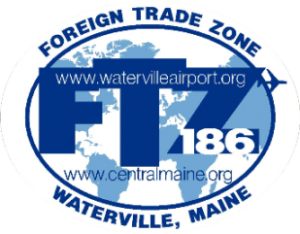Foreign Trade Zone #186
FTZ #186 covers 9 counties in Maine and is administered by Central Maine Growth Council and the City of Waterville.
The U.S. Foreign-Trade Zone (FTZ) program is an economic development tool to (i.) decrease overall costs, (ii.) increase supply-chain pace, and (iii.) provide the FTZ user with a more competitive cost structure. In 2019 (most recent data), there were 193 active FTZs in the U.S., with 348 active production operations.
The federally managed FTZ program includes four distinct opportunities to save money in supply chains and to lower overall operations costs, as noted below.
FTZ Opportunities to Lower Cost and Increase Efficiency
1. Duty Delay and/or Reduction
All goods entering the U.S. are subject to a “duty rate” based on formulas for imports from U.S. Customs and Border Protection (CBP). Under normal programs, duties are paid at the time of entry into the commerce of the United States. However, under the FTZ program, duties are only paid on goods when they are removed from the FTZ, producing a strong cash-flow benefit to the users who store goods in their FTZ. Only when the finished products are removed from the zone is the duty calculated, and is calculated based on the duty schedule of the finished good, not the components.
2. Duty Exemption
In the following cases, no duty is placed on imported goods:
– Imported goods are waste or rejected for defective parts.
– Imported goods are later re-exported from the FTZ.
3. Inverted Tariff
In situations where zone manufacturing results in a finished product that has a lower duty rate than the rates on the foreign imported products (inverted tariff), the finished products may be entered at the duty rate that applies to the foreign import. In sum, the FTZ user may elect to pay the more advantageous duty rate of either the imported good or the finished product.
4. Merchandise Processing Fees
These fees on each bill of lading are paid when a Customs entry is filed with CBP. The fee is paid based on the value of the goods documented. When entered in the commerce of the U.S, the goods are considered “domestic” and can be moved after the entry fees are paid to CBP. In an FTZ environment, the FTZ operator only pays one entry fee per week, regardless of the number of entries filed.
Evaluate FTZ Benefits
For businesses, municipalities, and economic development agencies looking to evaluate the applicability of a business operating within an FTZ environment, a straightforward method of assessment is asking the following questions:
• Do you manufacture, assemble or process with imports?
• Do you scrap, reject, destroy, waste, or return some of your imports?
• Do you export previously imported materials?
• Do you regularly pay more than $485 per week in merchandise processing fees (MPFs)?
If a business can answer “YES” to any of the above, then operating within an FTZ may be recommended. For more detailed information about FTZ benefits, visit FTZ Online and contact Central Maine Growth Council at (207) 680-7300 or director@centralmaine.org.




